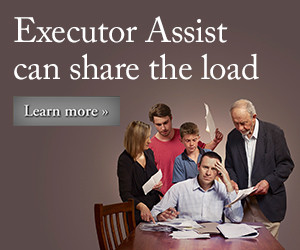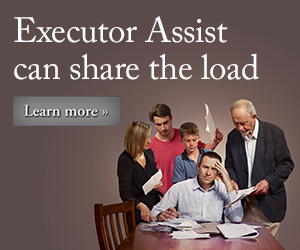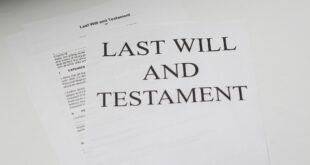 Being asked to be an executor of someone’s Will is not always easy. While it may be a compliment to be asked, it can also be an unforeseen, complicated business.
Being asked to be an executor of someone’s Will is not always easy. While it may be a compliment to be asked, it can also be an unforeseen, complicated business.
You will face making commercial decisions, meeting legal responsibilities, investing valuable time and possibly the prospect of stepping into a minefield of family dynamics…
Getting started – probate
Before an executor even begins, you need to get “probate.” Probate is a document issued by the High Court, which certifies a Will’s validity and confirms the appointment of an executor to administer the estate of the deceased. Approval time varies but usually takes about a month.
Probate involves meeting a lawyer to instruct them to write an affidavit. Gathering relevant evidence (i.e. the Will, and death certificate) and then swearing (under an oath or affirmation) that it is a verified statement of truth.
After probate, what are the key tasks an Executor typically does?
– Taking responsibility for the funeral arrangements and organising payment of the expenses.
– Dealing with any family feedback, should there be concerns.
– Checking over the financial records to view the pattern of income and expenditure.
– Identifying all assets of the estate and managing the closing of bank accounts, ceasing automatic payments and/or direct debits, the sell-down of property and/or shares.
– Arranging for the payment of all debt liabilities and creditors.
– Maintaining accurate accounts recording all transactions funds paid and received.
– Generally administering the deceased’s estate in accordance with the terms of the Will, any relevant legislation and dealing with beneficiaries.
– Day to day activities such as feeding pets.
There is a way to manage family dynamics…
An executor typically inspects the deceased’s bank statement records in the months leading up to their passing to establish a pattern of income and expenditure.
It leads to stock standard questions like “what direct debits are set up that need to be dealt with?” says Jim McIlroy, Public Trust Estates Manager.
But what if the executor spots a large withdrawal that doesn’t appear to have an explanation?
“That’s the real benefit of having a professional executor. We can discretely enquire and ask the family questions from a completely neutral stance. We get to the bottom of why a $50,000 lump sum has been withdrawn, that perhaps the family wasn’t aware of, and find out where it may have gone,” he says.
At other times although there may be a simple explanation about why a family member received a substantial cash gift, the rest of the family may disagree with why the recipient got it. From that point, things can get interesting. So, potentially having to deal with aggrieved family members also makes the role of executor a rather complex task.
“The biggest challenge that a private executor tends to face is managing difficult family dynamics, whilst fulfilling a role that is often new to them, at the same time they’re dealing with the loss of a loved one,” says Jacqui Beilby, Public Trust Manager, Executor Assist.
As a result many executors feel like the proverbial meat in the ‘Will sandwich’ when juggling a lack of time with the expectations of being responsible for carrying out the administration of a Will.
Executor Assist offers as much help as you need
Societal changes such as the growing complexity of blended families and increasing time pressures on executors led to Public Trust developing ‘Executor Assist.’
It’s a dedicated solution offering three services that give as much help or as little help as needed. Together they can cover all of your responsibilities as an executor.
1. Probate Service
If you are named as the Executor of a Will, applying for probate is your first duty. It may be your first time dealing with the High Court.
The Probate Service is for executors who would like Public Trust to help and support them with their application for probate.
2. Administration Service
The Administration Service expands the Probate Service. It is for executors who would like Public Trust to help them with key tasks relating to the estate: collecting the assets, paying any liabilities and completing tax returns.
3. Estate Service
The Estate Service is for executors who would like Public Trust to help them with the entire estate from Probate through to final accounts and distributions to beneficiaries.
The Estate Service is designed to ease the burden, while still giving you overall control of the process.
Private executors are relieved.
“Just to be able to talk to someone about the difficulties they’re facing and be heard has been quite cathartic for them,” says Jacqui.
Lawyers are relieved.
Why? Public Trust now support busy solicitors who see value in outsourcing the estate management function and partnering with interested members of the New Zealand Law Society.
Beilby clarifies the fee question.
“They’re calculated fairly, agreed upfront and documented. It’s for work done, not a percentage of the estate and based on a combination of fixed fees and hourly rates.”
Whether you need help with a particular executor task or perhaps need someone impartial and higher skilled to manage the whole process, get a free quote from the dedicated Executor Assist team.









Join the Discussion
Type out your comment here:
You must be logged in to post a comment.